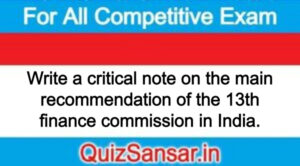
Write a critical note on the main recommendation of the 13th finance commission in India.
Write a critical note on the main recommendation of the 13th finance commission in India.
Or
Discuss the recommendation of 13th finance commission.
Or
Discuss in brief the main recommendation of kelkar committee.
Ans.
The Thirteenth Finance Commission was appointed by President of India under the chairmanship of Dr. Vijay L. Kelkar on November 13, 2007. The commission was asked to make its recommendations for a period of five years from 1st April, 2010 to 31st March, 2015. The commission has submitted its report on 29th December, 2009 covering the period 2010-2015.
Recommendations of Thirteenth Finance Commission
Thirteenth finance commission submitted its report on 29th December, 2009 covering the period from 1st April, 2010 to 31st March, 2015. The recommendations include restructuring of public finances, reducing fiscal deficit of center and state governments, introducing goods and services. tax, sharing of union tax revenues with states, etc. Its main recommendations are as follows:
1. Restructuring Public Finances
(1) Combined debt-GDP ratio to be brought down to 63 per cent by 2014-15. Combined debt includes debts of both centre and state governments.
(ii) Fiscal deficit to GDP ratio for the central government is targeted to be reduced to 3 per cent and that of all state governments in aggregate to 2.4 percent by 2014-15.
(iii) Revenue deficit to GDP of centre and states is to be brought down to (-) 0,5 per cent by 2014-15.
II. Sharing of Union Tax Revenues
(i) The proposed share of states in the net proceeds of shareable central taxes is increased from 30.5 percent as per 12th finance commission recommendation to 32 percent. This proposed share of 32 percent is uniform for all the states irrespective of the fact that they levy cess on sugar; textiles and tobacco.
(ii) Overall ceiling on transfers to states is fixed at 39.5 percent of centres” gross revenue receipts as compared to 38 percent by the Twelfth Finance Commission.
(iii) 13th finance commission has adopted the following criteria for division of central taxes like income tax, excise duty, etc.
III. Recommendations for Local Bodies
(1) Aggregate grant of Rs. 87,519 crore is recommended for local bodies for the period 2010-2015. Local bodies include Panchayats and urban local bodies. This grant will be shared by rural and urban areas on the basis of population size of the year 2001 (26.82 percent for urban areas and 73.18 percent for rural areas).
(ii) The commission has recommended special grants to local bodies of urban areas so as to upgrade core services like drinking water, sewerage, solid waste management, streetlights, etc. It is expected that urban population in India will increase up to 38 percent by the year 2026. So, more funds are allocated to urban areas so as to increase civic amenities in the urban areas accordingly.
(iii) Fifty percent of grants meant for local bodies will be allocated on the basis of population size.
IV. Recommendations for Disaster Relief
(i) It is recommended that existing National Climate Contingency Fund should be merged with National Disaster Relief Fund.
(ii) The size of National Disaster Relief Fund worked out at Rs. 33,581 crore.
(iii) For general category states, central government and state governments will contribute to National Disaster Relief Fund in the rado of 75:25. For backward states, centre and states will contribute in the ratio of 90:10.
(iv) The definition of disaster includes floods, earthquakes, landslides, avalanches, cloudburst, tsunami, pest attacks, lightning, cyclone, drought, fire, hailstorm, etc.
V. Grants-in-Aid to States
(i) Grants-in-Aid are important component of finance commission’s transfers. The commission has recommended total grant of Rs. 3,18,581 crore to states. It comes to 18.03 percent of total transfers.
(ii) Non-plan revenue deficit grant of Rs. 51,800 crore has been recommended for 8 states for the period 2010-2015.
(iii) Grants recommended for elementary education, environment protection, maintenance of roads and bridges, reduction in infant mortality rate, water management, improvement in supply of jusdce are of Rs. 24,068 crore, Rs. 15,000 crore, Rs. 19,930 crore, Rs. 5,000 crore, Rs 5,000 crore, Rs. 5,000 crore respectively;
(iv) A grant of Rs. 50,000 crore is recommended for compensating loss to states due to implementation of goods and service tax.
VI. Implementing Goods and Service Tax (GST)
Finance Commission recommended the implementation of goods and service tax. GST will be a type of dual tax having two components, i.e., (i) Central GST-5 percent (ii) State GST-7 percent.
Central GST will replace following taxes: Excise duty, service tax, surcharges and cess. State GST will replace value added tax (VAT), central sales tax, entertainment tax, stamp duty, tax on vehicles, etc. Very few exemptions will be given from GST so as to increase the scope of GST. The exemptions are available only on unprocessed food items, public services provided by government, health and education services. Earlier dealers with turnover below Rs. 1.5 crore were exempted from CENVAT. But in GST regime, the threshold limit (exemption limit) is reduced to Rs. 10 lakh. That way the scope of tax has been widened.
VII. Other Recommendations
(i) The proceeds of disinvestment of Public Sector Undertakings (PSUs) should be credited to Consolidated Fund. All non-working PSUs should be closed down..
(ii) In case of macro economic shocks, instead of increasing the borrowing limits of states, centre should borrow and provide funds to state governments.
(iii) Arrears of Pay Commission should be avoided by making the award commence from the date on which it is accepted, i.e., the future pay commission reports should be implemented from the date on which their recommendations are accepted and not from back date (i.e., the date on which pay commission presented its report) so as to avoid the problem of arrears that excessively burdens the centre and states.
(iv) The benefit of interest-relief and debt-relief (i.e., write-off/waive-off loan scheme) should be given only to such states who introduce necessary amendments in Fiscal Responsibility and Budget Management Act.






